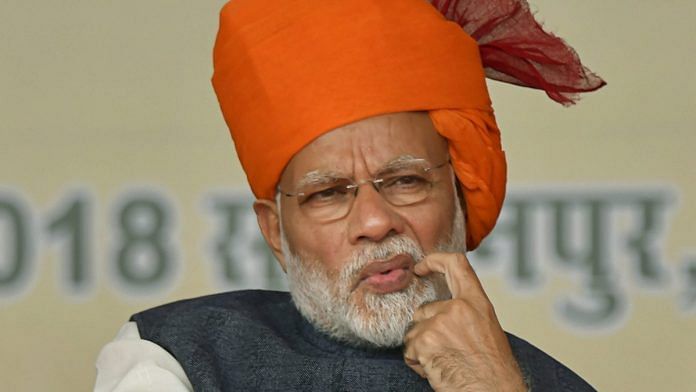There is something to be said about the appeal Prime Minister Narendra Modi enjoys among Indians. It goes beyond what he has delivered or not delivered in the last five years. To understand it in the election season, one must look into the traditional social signalling that works in Indian politics.
Recently, a hoarding of an aspiring MLA in Haryana’s Sonipat read: “Neta nahin Beta” (not a leader, but your son). When I asked my driver if it wasn’t more important to be a leader, he replied: “Madam,woh ek namrata hoti hai”, implying that it’s considered too arrogant to project yourself as a leader. To say you are more of a son than a leader is also a way to make an appeal to the social rather than the political impulse of democracy.
More importantly, it is an appeal to emotions of familial relationships that Indian politicians tap into and how it helps them in perception management.
Also read: Whether or not Modi remains PM in 2019, a new political generation will slowly eclipse the old
Ahead of the Lok Sabha elections, even the fiercest supporters of the Prime Minister in Gujarat, as elsewhere, would admit today that the Modi sheen has faded; the joblessness and farm distress have somewhat diffused the spell of 2014. And yet few would deny his basic legitimacy, even if they doubt his efficacy.
How are the gaps filled, rationalised, justified by those who believe him?
The conversation about the ‘beta vs neta’ hoarding took me back to two distinct instances about Narendra Modi over the past year and the public imagination he occupies in Gujarat.
While Gujarat may no more be central to this calculation, it is the state that formed the persona, andcontinues to provide important lessons on how this political myth continues to be sustained.
The film Sholay comes to mind.
Some days ago, when I was visiting an old couple in Ahmedabad, I was reminded of the iconic scene from Sholay where Jay (played by Amitabh Bachchan) defended every single fault of Veeru (Dharmendra) while presenting him as a match before his lady love’s grandmother. My friend was defending Modi the same way – smartly qualifying the gap between intentions and results, between his charisma and the inefficient system he is working with. “Narendrabhai ne saara loko malta nathi (Narendrabhai does not get good enough people to work with),” she said as she released herself from the burden of assessment.
Similarly, Veeru drinks, courts other women and gambles. But he is still the “most suitable” boy. I am quoting this comparison to point out how fallibility finds containment in strong allegiances. While ideology may be one of the reasons, it is not the only reason for the support Modi enjoys.
Also read: Modi or Rahul Gandhi? A guide on how to choose whom to vote for
To people outside Gujarat, this may seem to be yet another blind-fan moment, but our political understanding would be poorer if we fail to understand that these are filial networks working alongside democracy.
Take a look at another interaction in Gujarat. “Narendrabhai no kaagal aavyo chhe,” the owner of a reputed fabric store in Ahmedabad said. He was referring to his father’s birthday and how every year, without fail, the father is wished by Narendra Modi. I could have easily told myself this was another blind worshipper and walked away. Instead, I stopped for a moment to think. In the divided terrain between those who worship Modi to the extent that they overlook everything and those who see the confirmation of their worst fears, dialogue may seem far-fetched but it is still desirable. A granular differentiation of voices and locations may diffuse homogenisation, and in turn humanise the discourse somewhat.
What the store owner said about Modi showed that in the minds of some (or many), ‘Narendrabhai’ is like a vadheel, or an elderly, a buzurg. Just as elders are forgiven for the sacrifices they have made in the past, so has Modi in the minds of his followers in Gujarat. He has denied himself the pleasures of family life; the excesses of pleasure that money brings; and he is, therefore, the wise old man, who also has the dynamism to reach out to the young. The belief is that the family, and hence the nation, is in safe hands of the buzurg.
Also read: Here’s why Modi gets away with his gaffes, while Rahul Gandhi gets called Pappu
It is in this social realm in Gujarat, rather than the polemic political debates in TV studios, that Modi continues to have legitimacy and thrive. And this requires reflection. It is in this social sphere of Indian democracy that leaders are given familial epithets; and the audit is not conducted on the basis of delivery of justice, but the intensity of affiliation. This applies to Amma (J. Jayalalithaa), Didi (Mamata Banerjee), Behenji or Bua (Mayawati) and Bhaiyya (Rahul Gandhi) and the social kinships that Indian citizens forge on their political leaders.
This shapes the quality of leadership and policy-making as well.
Rita Kothari is a professor of English at Ashoka University.






